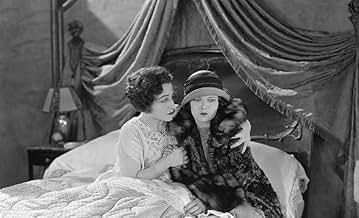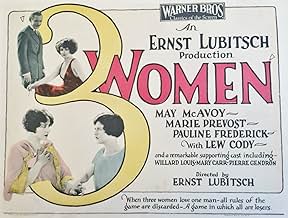A frivolous middle-aged socialite is suddenly put upon to have her daughter live with her. Her conniving paramour dumps her for her daughter, leaving her young boyfriend crushed.A frivolous middle-aged socialite is suddenly put upon to have her daughter live with her. Her conniving paramour dumps her for her daughter, leaving her young boyfriend crushed.A frivolous middle-aged socialite is suddenly put upon to have her daughter live with her. Her conniving paramour dumps her for her daughter, leaving her young boyfriend crushed.
- Awards
- 2 wins total
Max Davidson
- The Pawnbroker
- (uncredited)
Charles Farrell
- Reveler at Monkey Bar
- (uncredited)
George J. Lewis
- Reveler at Monkey Bar
- (uncredited)
Tom Ricketts
- Butler
- (uncredited)
Rolfe Sedan
- Reveler at Monkey Bar
- (uncredited)
Hal Thompson
- Butler
- (uncredited)
Jane Winton
- Charity Ball Guest
- (uncredited)
Storyline
Did you know
- TriviaAccording to a contemporary article in the entertainment press, the ornate ballroom at the Waldorf Astoria hotel was recreated on the newest sound stage at the Warner Bros. studio for this picture.
- GoofsJeannie Wilton is supposed to be a student at UC Berkeley going home to her mother in New York, but the train station on which she boards is clearly labeled "San Bernardino."
- Quotes
Harvey Craig: Have you any idea how much wealth is represented by that woman you have just held in your arms? Three million dollars!
Featured review
Over the years I've enjoyed a number of the silent features Ernst Lubitsch directed in Hollywood. His 1920s output includes some dazzling gems, such as Lady Windermere's Fan, The Marriage Circle, and So This is Paris. But until recently I'd never seen Three Women, a film that seldom receives public screenings, and isn't available in any format suitable for home viewing. This past weekend a rare print was shown at NYC's Film Forum, with live piano accompaniment provided by Steve Sterner, and it proved to be an engrossing, entertaining drama. Three Women bears the hallmarks of its director's famous style, yet at the same time its story ventures into a darker and more melodramatic realm.
This is the story of Mabel Wilton (played by stage veteran Pauline Frederick), a wealthy widow of a certain age who is worried about the relentless passage of time. When we first meet her she's nervously weighing herself on a bathroom scale, and is distressed at the results. Actually she's a perfectly attractive middle-aged lady, but the fact that her daughter is now a college undergrad—and has just reached her 18th birthday—is a disturbing reminder of her own advancing age. Daughter Jeanne (May McAvoy) yearns for a closer relationship with her mother, and can't understand why Mabel pushes her away. Into this uneasy mother-daughter relationship steps the disreputable Mr. Lamont (Lew Cody), a slick but shady businessman, a "womanizer" and spendthrift who struggles to keep his many creditors at bay. When he's introduced to Mrs. Wilton at a society ball Lamont coolly sizes her up, and this is conveyed to us in a very Lubitsch-like fashion: with a series of closeups noting the lady's jewels and expensive trinkets. That's all this guy can see.
Lamont approaches Mrs. Wilton to discuss a business deal, but before long his sales pitch turns into a courtship. In the midst of their affair Lamont meets Jeanne, and swiftly pivots to her instead. She's flattered, and feels lonely due to her mother's neglect; this, despite the attentions of a nice young medical student from college who is devoted to her. Unwisely, Jeanne agrees to marry Lamont. Her mother is initially shocked and hurt, naturally enough, but comes to accept the relationship. All too soon, however, Lamont is seeing another woman, Harriet (Marie Prevost), the third woman of the title. Tensions escalate into heated conflict and sudden death.
As even a brief synopsis suggests, we're not in typical Lubitsch territory here, story-wise. The first half of Three Women plays very much like a characteristic Lubitsch comedy-drama, complete with those stylish "touches" we associate with his work, such as the witty sight gags which convey the characters' true feelings, sometimes at odds with their outward show of behavior. A good example of an emblematic directorial technique comes when the young medical student Fred Colman (Pierre Gendron) is indecisive about giving Jeanne the gift of a bracelet. He hesitates, delays, decides to give her the bracelet, then changes his mind—and this is all conveyed with close shots of his hand reaching for his jacket pocket, where we know the bracelet rests. Very cinematic, and very much in the Lubitsch tradition. But the film's final scenes, especially the trial, with its tense build-up to the jury's verdict, feel quite different from this director's usual fare. A moralistic theme is introduced and emphasized, suggesting that Mabel Wilton deserves punishment for being a frivolous, negligent mother. This motif may come as a surprise to anyone expecting more continental-style sophistication along the lines of, say, The Marriage Circle.
In sum, I found Three Women well-made and interesting, if not on par with the best silent era work by this director. I especially admired the strong and sympathetic performance by Pauline Frederick, while Lew Cody is, as usual, a first-rate scoundrel; he really cornered the market in those roles in the '20s. He's such a cad, you have to wonder why an urbane lady of the world such as Mabel Wilton doesn't spot him for what he is more quickly. Maybe she should have gone to the movies more often!
This is the story of Mabel Wilton (played by stage veteran Pauline Frederick), a wealthy widow of a certain age who is worried about the relentless passage of time. When we first meet her she's nervously weighing herself on a bathroom scale, and is distressed at the results. Actually she's a perfectly attractive middle-aged lady, but the fact that her daughter is now a college undergrad—and has just reached her 18th birthday—is a disturbing reminder of her own advancing age. Daughter Jeanne (May McAvoy) yearns for a closer relationship with her mother, and can't understand why Mabel pushes her away. Into this uneasy mother-daughter relationship steps the disreputable Mr. Lamont (Lew Cody), a slick but shady businessman, a "womanizer" and spendthrift who struggles to keep his many creditors at bay. When he's introduced to Mrs. Wilton at a society ball Lamont coolly sizes her up, and this is conveyed to us in a very Lubitsch-like fashion: with a series of closeups noting the lady's jewels and expensive trinkets. That's all this guy can see.
Lamont approaches Mrs. Wilton to discuss a business deal, but before long his sales pitch turns into a courtship. In the midst of their affair Lamont meets Jeanne, and swiftly pivots to her instead. She's flattered, and feels lonely due to her mother's neglect; this, despite the attentions of a nice young medical student from college who is devoted to her. Unwisely, Jeanne agrees to marry Lamont. Her mother is initially shocked and hurt, naturally enough, but comes to accept the relationship. All too soon, however, Lamont is seeing another woman, Harriet (Marie Prevost), the third woman of the title. Tensions escalate into heated conflict and sudden death.
As even a brief synopsis suggests, we're not in typical Lubitsch territory here, story-wise. The first half of Three Women plays very much like a characteristic Lubitsch comedy-drama, complete with those stylish "touches" we associate with his work, such as the witty sight gags which convey the characters' true feelings, sometimes at odds with their outward show of behavior. A good example of an emblematic directorial technique comes when the young medical student Fred Colman (Pierre Gendron) is indecisive about giving Jeanne the gift of a bracelet. He hesitates, delays, decides to give her the bracelet, then changes his mind—and this is all conveyed with close shots of his hand reaching for his jacket pocket, where we know the bracelet rests. Very cinematic, and very much in the Lubitsch tradition. But the film's final scenes, especially the trial, with its tense build-up to the jury's verdict, feel quite different from this director's usual fare. A moralistic theme is introduced and emphasized, suggesting that Mabel Wilton deserves punishment for being a frivolous, negligent mother. This motif may come as a surprise to anyone expecting more continental-style sophistication along the lines of, say, The Marriage Circle.
In sum, I found Three Women well-made and interesting, if not on par with the best silent era work by this director. I especially admired the strong and sympathetic performance by Pauline Frederick, while Lew Cody is, as usual, a first-rate scoundrel; he really cornered the market in those roles in the '20s. He's such a cad, you have to wonder why an urbane lady of the world such as Mabel Wilton doesn't spot him for what he is more quickly. Maybe she should have gone to the movies more often!
Details
- Release date
- Country of origin
- Language
- Also known as
- Tri žene
- Filming locations
- 1170 West 3rd Street, San Bernardino, California, USA(Santa Fe Train Depot - built 1918, still in use 2021)
- Production company
- See more company credits at IMDbPro
Box office
- Budget
- $329,000 (estimated)
- Runtime1 hour 23 minutes
- Sound mix
- Aspect ratio
- 1.33 : 1
Contribute to this page
Suggest an edit or add missing content























